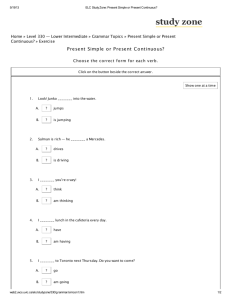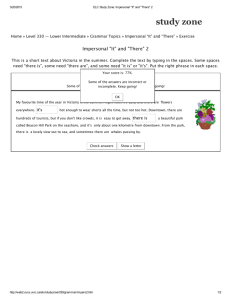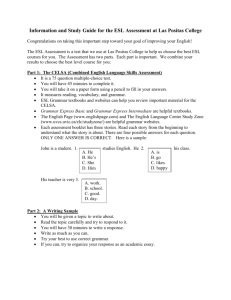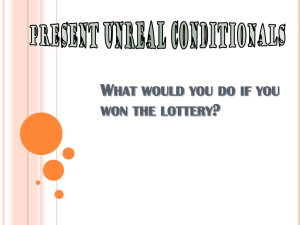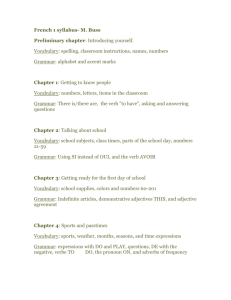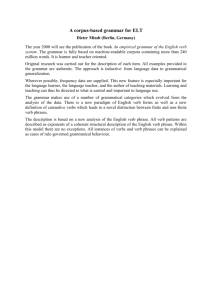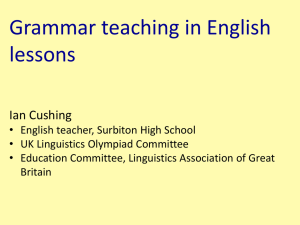Jan Peterson's Grammar 3 Extra Practice
advertisement
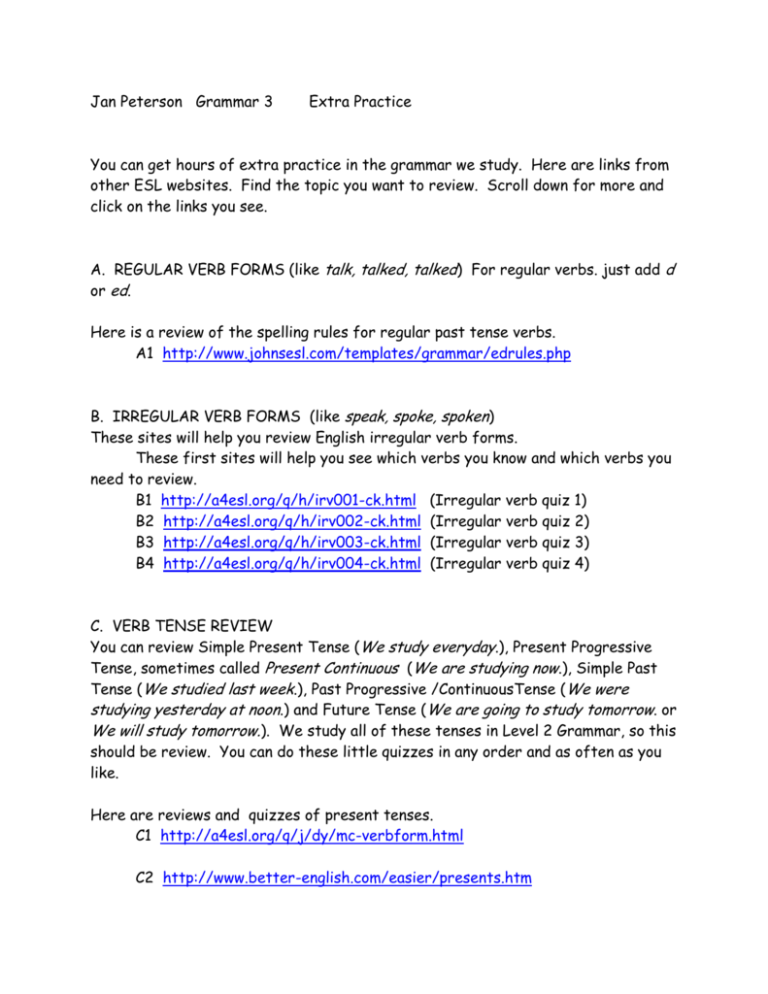
Jan Peterson Grammar 3 Extra Practice You can get hours of extra practice in the grammar we study. Here are links from other ESL websites. Find the topic you want to review. Scroll down for more and click on the links you see. A. REGULAR VERB FORMS (like talk, talked, talked) For regular verbs. just add d or ed. Here is a review of the spelling rules for regular past tense verbs. A1 http://www.johnsesl.com/templates/grammar/edrules.php B. IRREGULAR VERB FORMS (like speak, spoke, spoken) These sites will help you review English irregular verb forms. These first sites will help you see which verbs you know and which verbs you need to review. B1 http://a4esl.org/q/h/irv001-ck.html (Irregular verb quiz 1) B2 http://a4esl.org/q/h/irv002-ck.html (Irregular verb quiz 2) B3 http://a4esl.org/q/h/irv003-ck.html (Irregular verb quiz 3) B4 http://a4esl.org/q/h/irv004-ck.html (Irregular verb quiz 4) C. VERB TENSE REVIEW You can review Simple Present Tense (We study everyday.), Present Progressive Tense, sometimes called Present Continuous (We are studying now.), Simple Past Tense (We studied last week.), Past Progressive /ContinuousTense (We were studying yesterday at noon.) and Future Tense (We are going to study tomorrow. or We will study tomorrow.). We study all of these tenses in Level 2 Grammar, so this should be review. You can do these little quizzes in any order and as often as you like. Here are reviews and quizzes of present tenses. C1 http://a4esl.org/q/j/dy/mc-verbform.html C2 http://www.better-english.com/easier/presents.htm C3 http://web2.uvcs.uvic.ca/elc/studyzone/330/grammar/irrplu.htm You can review the pronunciation of verb +s at this site. C4 http://www.better-english.com/easier/thirdpers.htm Here is a lesson and exercises about “stative” (nonaction vs. action) verbs: C5 http://web2.uvcs.uvic.ca/elc/studyzone/410/grammar/stat.htm Here is a review quiz of the be verb in different tenses. C6 http://a4esl.org/q/j/jb/mc-be.html Here is review quiz of present, past, and future verb forms and tenses. C7 http://a4esl.org/q/j/ck/mc-vf02.html Here is a review quiz of future tense using going to. C8 http://a4esl.org/q/h/0101/sv-goingto.html Here is an explanation and exercise for 4 future forms. (more difficult) C9 http://web2.uvcs.uvic.ca/elc/studyzone/330/grammar/4fut.htm Here are good exercises for YES/NO and WH- questions. C10 http://web2.uvcs.uvic.ca/elc/studyzone/200/grammar/quest1.htm D. Present Perfect (We have had four quizzes so far.) We spend a lot of time with present perfect in this class. Here are several links with more explanation and practice. Here are pages that teach about present perfect. Then there are several exercises or quizzes at the bottom of the page. D1 http://www.englishpage.com/verbpage/presentperfect.html D2 http://web2.uvcs.uvic.ca/elc/studyzone/330/grammar/upperf2.htm D3 http://web2.uvcs.uvic.ca/elc/studyzone/410/grammar/pperf.htm Here is a little quiz with for or since with present perfect. D4 http://web2.uvcs.uvic.ca/elc/studyzone/330/grammar/upperf1.htm This quiz tests after, for, or since. D5 http://a4esl.org/q/j/vm/fb-afterforsince.html Here are several quizzes to practice the difference between present perfect and simple past. D6 http://web2.uvcs.uvic.ca/elc/studyzone/330/grammar/upperf2.htm D7 http://web2.uvcs.uvic.ca/elc/studyzone/410/grammar/ppvpast.htm D8 http://www.geocities.com/martbob/QuizP1.html Here are several quizzes that mix in present perfect with other tenses. (You can do more quizzes by clicking on the other links for basic tense review on the left.) D9 http://www.englishforjapanese.com/exercises/elementary/01%20easy%20verb%2 0mc.html Here is a good review of the time words for, since, ago. D10 http://www.englishforjapanese.com/exercises/elementary/16%20easy%20since%2 0for%20ago.html Do you need some review? This site will help you review Present Perfect and the other present, past, and future tenses. Click on the tense you want to review and practice. D11 http://web2.uvcs.uvic.ca/elc/studyzone/330/grammar/index.htm E. Present Perfect Progressive (also called Present Perfect Continuous We have been studying all day.) This site helps you with the form of Present Perfect Progressive. E1 http://www.5minuteenglish.com/apr15.htm Here is a page with an explanation and then links to several quizzes at the bottom. E2 http://www.englishpage.com/verbpage/presentperfectcontinuous.html IF you have a good Internet connection, this site gives you a little „mini video lesson.‟ E3 http://international.ouc.bc.ca/chalkntalk/perfectprogressive/ Here is a site that teaches more about Present Perfect Progressive. E4 http://www.geocities.com/martbob/QuizP1.html NO- same as above F. Modals You can try this exercise on polite requests using could you, would you, would you mind. F1 http://www.better-english.com/vocabulary/politerequests1.htm This exercises checks you understanding of polite requests with could you. F2 http://www.better-english.com/easier/couldyou.htm Here is a fun listening exercise for polite requests. Your computer needs sound for this one. F3 http://www.esl-lab.com/request.htm Here is a review and a quiz on have to, don‟t have to, must, and must not. F4 http://www.englishclub.com/grammar/verbs-modals-have-to-mustnot.htm Here is another site on the difference between don‟t have to and must not/mustn‟t. F5 http://web2.uvcs.uvic.ca/elc/studyzone/330/grammar/negmod.htm G. Nouns You can review spelling of +s in this quiz. G1 http://www.better-english.com/easier/plurals.htm Here is a game with flashcards to check what you know about +s spelling and irregular plural nouns. (You need to click on remove card to go to the next one.) G2 http://www.quia.com/jfc/67715.html Here is some explanation and an exercise at the bottom for irregular plurals. G3 http://web2.uvcs.uvic.ca/elc/studyzone/330/grammar/irrplu.htm Here are reviews of count and noncount nouns with exercises. G4 http://web2.uvcs.uvic.ca/elc/studyzone/330/grammar/count.htm G5 http://web2.uvcs.uvic.ca/elc/studyzone/410/grammar/count.htm Play these games with count or noncount nouns. Drag each word to its box. G6 http://www.collegeem.qc.ca/cemdept/anglais/countnc.htm G7 http://www.collegeem.qc.ca/cemdept/anglais/countnc2.htm G8 http://www.collegeem.qc.ca/cemdept/anglais/countnc3.htm Here are some fun quizzes and games on irregular plurals (man, men) G9 http://a4esl.org/q/h/vf004-bp.html G10 http://www.manythings.org/wbg/irr_plurals1-mw.html G11 http://www.manythings.org/wbg/irr-plurals2-jw.html G12 http://a4esl.org/q/j/km/mc-noncount.html H. Subject / Verb Agreement (The book is interesting. Those pictures are beautiful.) This quiz will practice there is or there are and will review many or much. H1 http://www.better-english.com/easier/counta.htm Here is more practice with there is or there are. H2 http://www.better-english.com/easier/count3.htm Here are two pretty difficult quizzes on Subject / Verb agreement. We study most, but not all of these types of sentences. You can try them if you want a challenge! H3 http://a4esl.org/q/j/kf/mc-svad.html H4 http://a4esl.org/q/h/9901/cw-svagreement.html I. Passive (My grandmother‟s canary was eaten by our cat.) Use this site as a simple introduction to passive / active verbs. I1 http://www.englishpage.com/verbpage/activepassive.html Here is a review quiz for passive / active and other verb forms. (It helps if you know about the movie Indiana Jones and the Temple of Doom.) I2 http://www.eslgo.com/quizzes/raiderspassive.html
